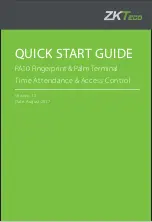NXP Semiconductors
AN11268
Quick startup guide for POS Development Kit OM5597/RD2663
AN11268
All information provided in this document is subject to legal disclaimers.
© NXP B.V. 2014. All rights reserved.
Application note
COMPANY PUBLIC
Rev. 1.0 — 2 September 2014
242410
13 of 17
3.2.3 Carrier on
Enables continuous unmodulated carrier output for e.g. ISO 14443 or EMVCo standard
power tests
3.2.4 Carrier off
Disables continuous unmodulated carrier output.
3.2.5 Polling WUPA WUPB
Starts a RF polling for both ISO 14443 Type A and Type B cards using the Wakeup
commands. Previous register settings will be overridden.
3.2.6 RF Reset
Enables the unmodulated carrier and creates an off-pulse of approx. 8 µs. The carrier will
always be enabled regardless of the previous state and will stay on afterwards.
3.2.7 WakeupA
Sends a single ISO 14443 Type A Wakeup (WUPA) command. Note that the reader has
to be explicitly configured to perform this action, using menu option ‘a’ to load the
necessary settings.
3.2.8 WakeupB
Sends a single ISO 14443 Type B Wakeup (WUPB) command. Note that the reader has
to be explicitly configured to perform this action, using menu option ‘b’ to load the
necessary settings.
3.2.9 RATS
Directly sends a single Request Answer To Select command. Please note that you have
to manually load the configuration settings for ISO14443 Type A before using this option.
3.2.10 ATTRIB
Directly sends a single ATTRIB command. As for the RATS command, you have to
manually configure the reader for ISO 14443 Type B protocol. Again, use menu option ‘b’
to do so.
3.2.11 Test with Validation Cards
Starts a continuous polling sequence for use with the official EMVCo validation cards.
3.2.12 Display Registers
Displays a register dump from 0x00 to 0x57 in the format “register: value” separated by
commas.
3.2.13 Write Registers
Allows you to change the value of a given register. This is useful when fine-tuning certain
settings as for example the threshold.
Downloaded from
Downloaded from
Downloaded from
Downloaded from
Downloaded from
Downloaded from
Downloaded from
Downloaded from
Downloaded from
Downloaded from
Downloaded from
Downloaded from
Downloaded from


















